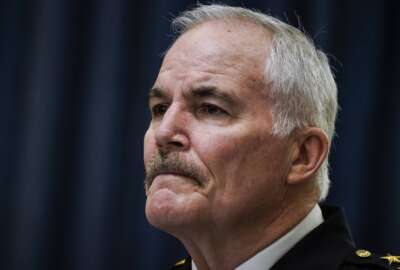
Why Capitol Police reform is taking so long
For several years, the Government Accountability Office (GAO) has issued recommendations for reforming the Capitol Police.
For several years, the Government Accountability Office (GAO) has issued recommendations for reforming the Capitol Police. Federal Drive with Tom Temin‘s guest has compiled all of the studies and recommendations, as well coming up with a few reform ideas of his own. Taylor Swift is a senior policy adviser with Demand Progress.
The report from Demand Progress: https://s3.amazonaws.com/demandprogress/reports/DPEF_Capitol_Alert_report_on_US_Capitol_Police_accountability.pdf
Interview Transcript:
Tom Temin Now, Demand Progress focuses on transparency and accountability, primarily in the legislative branch of government. Fair to say. So this is why you decided to focus on the Capitol Police, which is one of those agencies of Congress?
Taylor Swift Yes, absolutely. Given that over the past two and a half years, there has been quite a large call to have the Capitol Police reform both its internal and public facing operations, given the massive failures from the January 6th attack on the Capitol. We thought that it was of paramount importance to kind of examine where the Capitol Police has been putting its resources and how it’s been meeting its congressional directives since the January 6, 2021 attack.
Tom Temin And rather than relate what happened on January 6th, which has been pretty well covered ground, what are the fundamental flaws in management of the Capitol Police that gave rise to that situation? And it’s not the only situation they’ve had some trouble with.
Taylor Swift Yeah, that’s a great question. So to kind of put it in perspective, the Capitol Police continues to grow both from a scope perspective, but then also within its budget. Over the past five years, their budget has grown 70%. It’s upwards to around $800 million or 13% of the entire legislative branch Appropriations Subcommittee. So that is a pretty sizable chunk, right, That goes to protect the Capitol, protect members of the public that comes in to the Capitol all the time. It’s a really, really, really, really important task. But as we saw on January 6th, there was leadership and intelligence gathering failures that left them woefully unprepared. And we were so, so, so close to catastrophe. It could have been even worse than it already was. And so since those events, there have been numerous congressional directives, both from committees of jurisdiction and then other legislative branch agencies like the Government Accountability Office, to kind of reform the operations of not only the Capitol Police internally, but then the United States Capitol Police Board, which is the oversight structure that kind of manages the Capitol Police from afar. Unfortunately, the structure of the board itself is it’s kind of rampant with conflict of interest, because they have the ability to hire and fire the inspector general. But the Capitol Police board also has the Capitol police chief serve as an ex-officio member. So there is kind of this blurred inherent conflict there. And we’re kind of seeing that as some of the data in our report suggest. And I’d love to get into it.
Tom Temin Yes. And there’s been a series of chiefs and they seem to have been unable to effectuate, I guess, meaningful change. Fair to say.
Taylor Swift Well, there has been some meaningful change. We’ve actually seen a uptick in the resources available for rank and file officers. They’ve created a wellness center. They’ve reformed overtime pay provisions. They’re starting to put more resources into combating diversity issues and combating bias issues and training things like that. But unfortunately, there are still a lot of outstanding issues within the department that, quite frankly, the public doesn’t really know about. And so some of those come from those directives from Congress directly, and then some of them do come from the Government Accountability Office. They deal with like emergency preparedness processes around how decisions are made, both in a emergency management perspective, but then also regular day to day. And then there’s also continuing ongoing issues. And this was even an issue before the Jan. 6 attack, information sharing. The Capitol Police has been known for over a decade for being notoriously opaque, and they have kept reporters and the public and even at times congressional appropriators who fund the agency in the dark about their operations. And so that kind of leads us to where we are today. There have been some improvements, but they’re still woefully behind where they should be.
Tom Temin We’re speaking with Taylor Swift. He’s a senior policy adviser with Demand Progress. And so this idea of even releasing IG reports, for example, they don’t release those to the public, and that’s pretty much at variance with almost every other IG in the government.
Taylor Swift You nailed it. So two weeks ago, there was actually a Capitol Police inspector general hearing before the House Committee on Appropriations and the new IG, Mr. Russo, who was appointed in January, briefly mentioned that since the IG’s inception in the middle 2000s, there have been 650 inspector general reports dealing with the Capitol Police. Unfortunately to date, there have only been four released to the public, which is rather astonishing. And to make matters worse, those four have all been released within the last four months. So up until April of this year, there were no public IG reports released to the public.
Tom Temin All right. So transparency, leadership, intelligence gathering, preparedness and decision making in situations. What do they need to do? I mean, what reforms are undone that you feel are most urgent that they take on?
Taylor Swift Absolutely. So one of our biggest recommendations actually echoes what congressional appropriators have been asking of the department for quite some time for three years now. And that’s actually to establish a Freedom of Information Act like process. A lot of people don’t know that most departments, most metropolitan police departments around the country have FOIA. It allows the public and journalists and others to ask for that information. Well, since the United States Capitol Police is technically under the legislative branch, they aren’t subject to FOIA. And so several years ago, the congressional appropriators mandated that the Capitol Police develop this process. And last week during the Capitol Police board hearing, which by the way, was the first Capitol Police Board hearing since the end of World War II, was the first one in almost 80 years. The Capitol Police chief mentioned in his written testimony that they are still working on this process. Unfortunately, congressional appropriators have been asking this for going on three years now, so they’re kind of dragging their feet. So that’s step one. We’ve already talked about the lack of transparency around an inspector general reports the board and the department has been working with the iG’s office to create a more transparent process to publicly release these reports. But unfortunately, we don’t know what that process looks like. There isn’t a written guideline that is published on its website, so we really don’t know how that works. And then the board meeting minutes. So this this Capitol Police board, they meet regularly. They don’t really meet with external or public stakeholders. They do meet with congressional stakeholders, which is great. But those meeting minutes are not published. We do not have access to what goes on in these meetings, even if it’s not highly classified or sensitive information. There isn’t really a record of what is going on. So we don’t really know what’s being done. And then to that point, many metropolitan police departments all over the country have civilian oversight boards. It would be great if the Capitol Police and congressional appropriators and other committees of jurisdiction would look to develop some sort of public stakeholder or oversight board so that there can just be more sunlight, so that there can just be more communication to both the public, but then also the folks that live around the Capitol so that people know what’s kind of going on.
Tom Temin And just what about some of the operational issues? Those are all transparency, accountability, financial management and these kinds of things which are foundational. But are they good at training policemen to do police duty or are they getting better at intelligence gathering and straightening out a command and control system so that when a January 6th type event happens, they know what to do and everyone’s trained to know what to do.
Taylor Swift So that is a fantastic question. It’s kind of up in the air right now. So several of the GAO recommendations that have been made over the past several years do deal with these processes and these training pieces. Unfortunately, up until this point, there have been 11 total recommendations. The United States Capitol Police has only complied with two of them. So those open recommendations kind of leave this gap in security and safety. And we just want to make sure that the Capitol Police, given their ballooning resources, are making sure that Capitol Police are trained the right way, that the Capitol is secure and that it’s being done correctly. And so that is, I guess, one of the reasons why we wanted to publish this report is that it’s been two and a half years since this colossal failure at the leadership level and the intelligence level. God forbid something like this ever happens again. But we want to make sure that the Capitol Police are being transparent and honest about how they’re making these reforms so that they’re doing it the right way, especially since their budget has gone up basically 70% since January 6, 2021.
Copyright © 2025 Federal News Network. All rights reserved. This website is not intended for users located within the European Economic Area.
Tom Temin is host of the Federal Drive and has been providing insight on federal technology and management issues for more than 30 years.
Follow @tteminWFED




